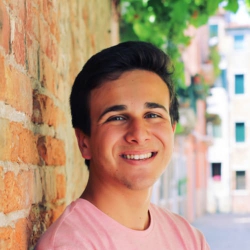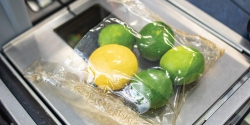The Man Behind Neptune
PROVO, Utah – Mar 09, 2020 – As Marx Acosta-Rubio biked down the streets of Florida, he was struck by the sheer volume of trash piled everywhere. Garbage lined the beaches, covered the roads, and littered the sidewalks.
“I want to do something about this,” he thought. At the time, however, Acosta-Rubio was serving as a missionary for The Church of Jesus Christ of Latter-day Saints—his time and resources were limited, to say the least. He settled for penning the idea in his notebook and decided to take a look at the issue when he returned to BYU.
After coming home and starting school, Acosta-Rubio quickly found his schedule filled with classes and events. It would have been easy to dismiss his Florida idea as too time-consuming or write it off as a project for later. However, Acosta-Rubio was determined—he knew he had something to contribute.
Acosta-Rubio’s first step in trying to solve this waste problem was visiting BYU Marriott’s Rollins Center for Entrepreneurship and Technology and joining its mentorship program. The Rollins Center’s mentorship program is designed to help students flesh out and improve their business ideas and helped connect Acosta-Rubio with a someone who helped him find the right direction for his inspiration. When Acosta-Rubio pitched his original idea—an eco-friendly plastic water bottle—his mentor challenged him to find out which companies were already producing something similar. With this new direction, Acosta-Rubio began adjusting and tweaking his proposal.
After some work refining how he wanted to approach the plastic-waste problem he’d seen, Acosta-Rubio decided to create a unique plastic business. With the help of a friend, Acosta-Rubio came up with an idea for eco-friendly, biodegradable plastic that could be used and discarded without hurting the environment. He wanted this new plastic to dissolve completely, not just break into harmful microplastics like existing plastics do.
With the idea nailed down, Acosta-Rubio needed someone who could help him execute. Acosta-Rubio delivered his pitch for a better plastic to a classroom of chemical engineers at BYU. Over the coming days, several interested students emailed him their résumés. Among the number of applicants seeking to work with Acosta-Rubio was chemical engineering student Hal Jones, whose experience in the world of biodegradable polymers earned him a spot as part of the founding team. With the right people onboard, Neptune Plastics was ready to make its debut.
Neptune’s innovative approach to biodegradable plastics has not gone unnoticed. In March 2019, Neptune Plastics won second place in BYU’s Student Innovator of the Year competition. Later that year, it claimed a best venture award from the Ballard Center’s Social Venture Competition. Judges, students, and professors alike were fascinated by Neptune’s invention—an all-organic, plant-based plastic that dissolves completely in water. Acosta-Rubio believes this product just might prove to be the fix for the waste he saw in Florida.
For students interested in innovation and doing something similar to what he is doing, Acosta-Rubio offers the following advice: “A lot of people will tell you there’s a certain way to do things—like a set path you have to follow. But here’s the thing. There will never be enough time, never enough resources. You just have to hop off the path and go for things. If you accept that you don’t know what you’re doing and go in trying to learn as much as you can, people are willing to help you out.”
Media Contact: Chad Little (801) 422-1512
Writer: Zelle Harris





